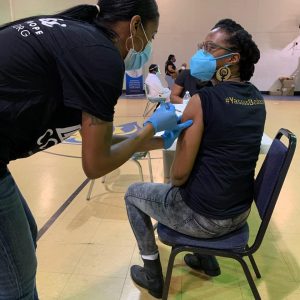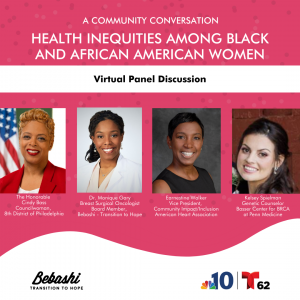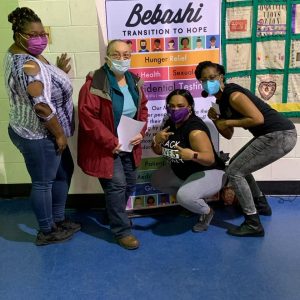Bebashi announces the launch of the Female Empowerment Kit during a virtual panel discussion on health inequities affecting African American women



Bebashi – Transition to Hope is empowering women to take control of their sexual health and overall well-being.
On Tuesday, March 23, 2021, the organization hosted “A Community Conversation on Health Inequities Among Black and African American Women,” the second in a series of virtual panel discussions that encourages meaningful dialogue on important issues that affect our Philadelphia communities.
The panel, which included Councilwoman Cindy Bass; breast surgical oncologist, Dr. Monique Gary; Earnestine Walker, Vice President, Community Impact/Inclusion, American Heart Association; and Kelsey Spielman, Genetic Counselor, Basser Center for BRCA at Penn Medicine, spoke on the various factors that influence health equity, and challenged individuals to change the way they think about and deal with health disparities.
“Health disparities are not caused by race, but by racism. Although we measure it by race, race is a causality of racism,” said Earnestine Walker.
One major area of concern that was raised by the panelists was the underrepresentation of black and African American women in clinical trials. “The number one reason black women are not enrolled in clinical trials is because they are not asked,” said Dr. Gary. “From 2016 there have been approximately four new breast cancer drugs on the market, that have been approved by the FDA, and less than three percent of black women were included in each of those trials.”
This is something that Dr. Gary says is in need of change, as well as the need for greater representation of black and African American women at the clinician level.
In addition to the widely recognized social determinants of health, another factor that was discussed that affects a person’s ability to get appropriate and timely care and treatment, is the inaccessibility or lack of knowledge of family or genetic history. Although the knowledge of family history is integral to ensuring that persons are screened earlier for conditions such as cancer, high blood pressure and diabetes, many individuals do not know or do not have access to this information.
Councilwoman Bass highlighted the number of young people who are displaced through adoption or the foster care system and stressed the need for a national conversation about screening, access and making sure that persons can get the professional services that they need, regardless of not having knowledge of their family history.
During the event, Bebashi’s Wellness Clinic also announced the introduction of the Female Empowerment Kit, a free and necessary resource for women to take control of their sexuality and sexual health.
The kit, which will be available within the next few months for the organization’s clients, is just one of the ways Bebashi works to make quality healthcare, health education and resources more accessible to low-income and underserved communities, and will include an in internal condom, a male condom, a handheld mirror, a sexual health fact sheet and an at-home HIV test kit.
The organization will host its third community conversation on May 25 on the topic of LGBTQ+ access to culturally sensitive and relevant healthcare.
To learn more about Bebashi and upcoming events, visit bebashi.org or call 215-769-3561.
Missed the conversation? Watch the full recording below:
Media Contact:
Jude-Anne Spencer-Phillip
Communications Specialist
Bebashi – Transition to Hope
Phone: (215) 769-3561 ext. 159
Email: judeannesp@bebashi.org
